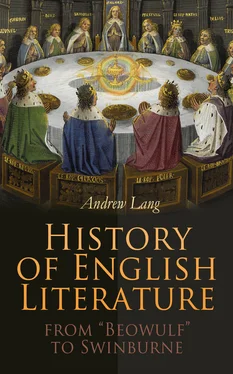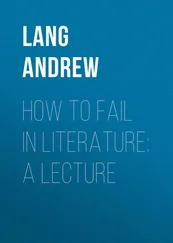What can be more romantic than this tale of the golden shadow of love that glides through the darkling bower—told by a nun with bowed head, shamefast! We are reminded of the lines in which Io, in Æschylus, tells of the shadowy approaches of Zeus, the king of gods; and the voice that spoke to her in dreams.
The Greeks had another such tale of the gold that fell in the tower of Danaë before the birth of Perseus. The origin of Layamon's story may be in some ancient Celtic myth of the loves of gods and mortal women, and of Merlin, son of a god.
From his shadowy nameless father, Merlin received his gift of prophecy, and, from the first, foretold the Passing of Arthur.
In Layamon's poem we find what does not occur in the older Anglo-Saxon poems, such as "Beowulf," the use of similes in the manner of Homer, whose warriors charge like lions, hungry, and beaten on by wind and snow. Thus, too, in Layamon's verse,
"Up caught Arthur his shield, before his breast, and he 'gan to rush as doth the howling wolf when he cometh from the wood, flecked with snow, and thinketh to seize what beasts he will."
Arthur defeats the Saxons, and drives them from the ford of the river, through the deep marshland,
"And as the wild crane in the fen, when the falcons follow him through air, and he wearies in his flight, but the hounds meet him in the reeds; as he can find no safety whether in field or flood, even so the Saxons were smitten in ford and field, and went blindly wandering."
These similes give clear, vivid pictures of life in fen and forest, and enliven the poem in the true epic way, and Layamon gives, perhaps, the first English picture of an English fox-hunt. In his poem, Guinevere does not love Launcelot, but the traitor Modred, and when Modred is defeated by her husband, Arthur, she flies to Caerleon, where "she hooded her and made her a nun," and her end is unknown.
In the last great battle in the west, both hosts fall—it is a field of the dead and dying. Arthur bears fifteen wounds. He is alone with Constantine, to whom he entrusts his kingdom. "But I will pass to Avalun, to the fairest of all maidens, to Argante the Queen, an elf most beautiful, and she shall make my wounds all whole with draughts of healing. And afterwards I will come again to my kingdom....
"Then came floating from the sea a little boat, and two women therein, shaped wonderfully; and they took Arthur anon, and bore him to that boat, and laid him softly down, and went their way. Bretons believe that he liveth yet, and wonneth in Avalun, with the fairest Queens of Faery."
Do we not already seem to hear the voice of Tennyson's weeping queens, as the king floats into the night?
Romance has come to England, and from the mingling of races and tongues—Celtic, French, English—an English poet has been born: a man who sees with the eyes of imagination, and who can make us share his visions of the golden shadow that was father of Merlin; of the wolf with the snow caked on his matted hide as he rushes from the wood; of the hawking party in the fens; of the battle by the tidal waters of the west.
Layamon is full of promise of good things to come, as in his description of Goneril and her husband, when she begins to grudge to her father, King Lear, the expensive service of his forty knights; while her husband feebly opposes her unnatural avarice. (The story of Lear is also in Geoffrey of Monmouth, and is based on a common folk-tale.)
Again, when Layamon's Arthur laughs over the slain Colgrem, "...Lie there, now, Colgrem; high hadst thou climbed this hill, as if thou wouldst win heaven, now shalt thou fare to hell, and there find thy kinsfolk,..." we are carried back to the boasts over the dead that Greeks and Trojans utter in the Iliad. But these great touches are rare in the 30,000 lines of Layamon, the mass of his poem "is blank enough".
Layamon thought himself a chronicler in rhyme, a historian; in his book he has many tales, not that of Arthur alone; he has dull passages in plenty, none the less the good priest had many qualities of the great poet.
The verse of Layamon is sometimes of the old Anglo-Saxon sort already described, with alliteration and without rhyme; and in other parts consists of rhyming couplets varying in length, all intermixed. A rhyming couplet is
Thet avere either other
luvede alse if brother . That ever either other Loved as if brother.
In the words the tendency is to drop the old inflections, the language is shaking off its original grammar and approaching modern English. In the later of two manuscripts of the poem this tendency is much more strong. Thus the older manuscript has
He wes a swithe aehte gume
And he streonde (begat) threo snelle sunen.
The later copy has
He was a strong gome
And he streonede threo sones.
The word "snell" in the older version still survives in Scots,
"There cam a wind out o' the East
A sharp wind and a snell ,"
snell meaning "keen".
Layamon was too great a poet to mingle sermons with his song. The pulpit was his preaching place, he scarcely ever preaches in his poem. On the other hand the worthy brother Ormin or Orm did nothing but preach in his versified book "The Ormulum". He was an Augustinian canon of the North Midlands who, about 1200, paraphrased the Gospels read on each day, and the homily which followed, often drawn from Bede (for Orm was not an advanced theologian), in a kind of blank verse. Nothing could be more simply edifying to plain congregations, but edification is not the aim of literature. Orm is best known for his determination to have English properly pronounced. A vowel, in English is, and was, sounded short before two consonants, and Orm was bent on making the reader pronounce the vowels thus and not otherwise. He therefore wrote the two consonants after every short vowel, and explained himself thus, the lines also give the metre of his verses:—
And whase wilenn shall thiss hoc
Efft others sithe writenn
Him bidde Icc thatt het write rihht
Swa summ thiss hoc him teachethh....
And tatt he loke wel thatt he
An bocstaff write twiyess
Eyywhaer thaes itt upo thiss boc
Iss written o thatt wise.
By using some Scots words we may translate this in the original metre.
And whasae willen shall this book
Another time be writing
Him do I bid that he write richt
Even as this book him teacheth.
And that he do look well that he
Ane letter writeth twice
Aye there where it upon this book
Is written in that wise.
The metre is very like that of the Scottish rhymed version of the Psalms, though Orm (as in the second verse above) only uses rhyme by accident. The "Ormulum" is not to be "read for human pleasure," though it is interesting to students of the language and versification while in a state of transition.
The same may be said of a number of works in prose or verse which are to be found by students in editions published by learned societies. It is necessary to say something of them, because it is a kind of duty to be aware of their existence, though few but specialists can be enthusiastic over their merits, save in one or two cases. They show how the language and the modes of versifying were going forward, and becoming such as a great poet like Chaucer could improve; or, on the other hand; language and verse were going backwards, deserting rhyme and depending (as in Anglo-Saxon) on alliteration, or alliteration mixed with rhyme.
Among the works of this period which were useful or pleasant in their day, the longest book in prose is the "Ancren Riwle," or "Rule of Anchoresses," ladies who were not exactly female solitaries, but lived together religiously, each with her maid. The author, whoever he may have been, bids them say, if any one inquires, that they are "of the Order of St. James". There was no such Order, but St. James bids us visit the widow and the orphan, and keep ourselves unspotted from the world. This , says he, is true religion. The three ladies dwelt together at Tarente in Dorset. The language is of the same period as Layamon's "Brut," very early in the thirteenth century. The style is simple and free from decoration, the dialect is that of western England. The advice to the ladies is excellently pious; no severe austerities are recommended, except silence at meals. An anchoress "should not speak with any man often or long," and should have a witness (probably out of ear-shot), even when she confesses, since "the innocent are often belied for want of a witness". Flirting, and belief in luck and in dreams and witchcraft, are severely reprobated. Scepticism is attributed to intellectual pride. "Wear no iron" (James IV wore an iron girdle under his clothes), "nor hair cloth, nor hedgehog skins"; the ladies are not to flog themselves, unless their confessor permits, and their shoes are to be thick and warm. The author remarks that, God knows, he would rather set out on a voyage to Rome than write his book over again: he may have feared that the ladies would lose their copy.
Читать дальше












